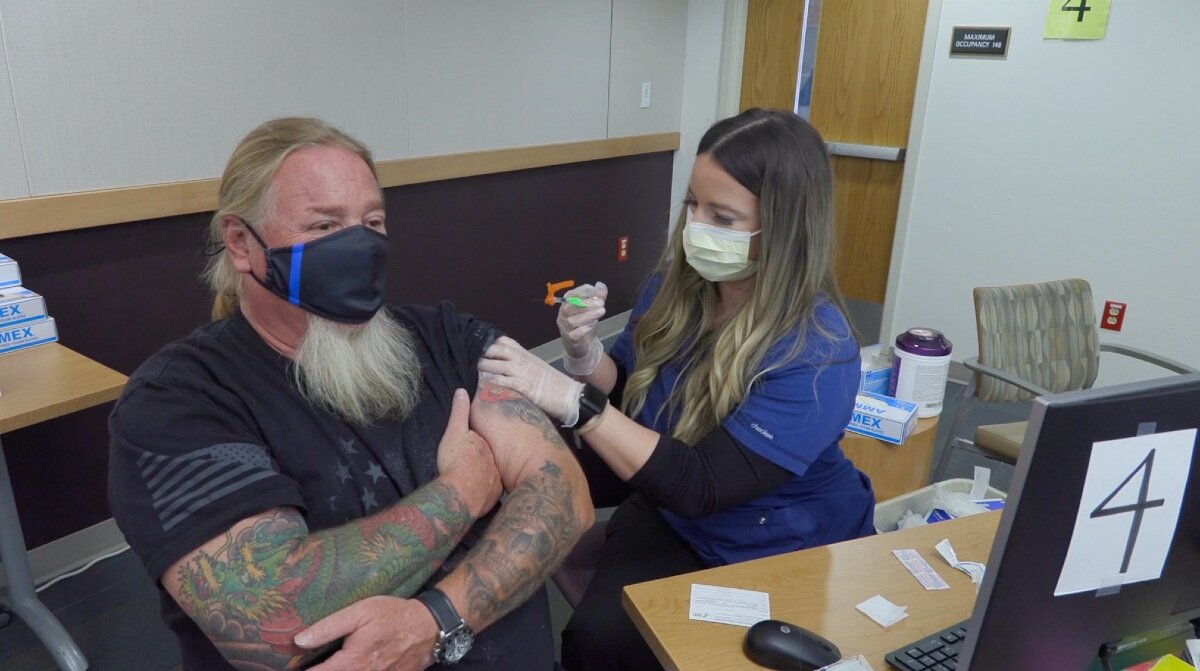A year later, a Colorado COVID-19 survivor reunites with the medical heroes who helped save his life

HIGHLANDS RANCH, Colo. — For a moment, while bear-hugging the intensive-care nurse who fought to rescue him from approaching death, Barry Kittay was at a loss for words. Then he found his voice.
"I'm here, because of you," he told her.
Kittay entered UCHealth Highlands Ranch Hospital a year ago — March 21, 2020, just a few weeks after the first cases of COVID-19 were reported in the United States. He didn't emerge for three weeks.
For much of that time, Kittay was in the intensive-care unit, under sedation and on a ventilator. "I was basically unconscious through the whole thing," the Highlands Ranch man said. "... To me, it's a big blank."
The disease would go on to claim nearly 540,000 American lives over the year that followed, but back then, it was still little known. Kittay was the hospital's first COVID patient, and the medical team struggled to find ways to save him, not at all certain that they could.
Timeline: Barry Kittay's battle with COVID-19
Doe Kittay first shared her husband's story with Rocky Mountain PBS while he was still hospitalized. She told of his fight to breathe, his high fever, and the long weeks of not being allowed to be with him.
“I don’t wish this upon my worst enemy,” Kittay, 55 pounds lighter, said shortly after his release last April.
A neighborhood celebration of Kittay's survival felt good, but his fight wasn't over: "It took me two months to basically learn how to walk again," he said recently.
This week, for the first time since his release, Kittay reunited with the ICU team that helped save his life, including nurse Delayna Frint and Dr. Surit Sharma.
"Oh my gosh, it's so good to see you! You look so good!" Frint gushed as she moved in for a hug.
Sitting with Frint, as she recounted his struggle with the disease, Kittay said he could remember little of the experience.
One thing he could remember: Frint waking him up when he was about to be ventilated and asking him if he had a will. "That was a stunning question, by the way," Kittay told her.
Frint spoke of the uncertainty the medical team felt in treating their first COVID patient. "We were in the midst of, 'What is this? Are people going to make it out alive? How do we navigate through this?'"
Kittay making it out of the ICU was "a turning point," she said. "It was a sense of relief, of, 'Wow, this is curable.'"

Kittay admits he started out as a coronavirus doubter.
"I didn't actually believe it was a real thing until I got it, to be honest," he told Frint. "I was one of those ... ones who said, 'I don't believe this.' That all changed."
And it was Frint who administered Kittay's shot of COVID vaccine during his reunion visit. (Medical experts advise that even those who have been sick with the disease should get vaccinated because of uncertainty about whether illness can recur.)
Calling Kittay "strong willed" and "a fighter," she congratulated him for beating "one of the worst viruses in the midst of the worst pandemic that any of us have ever been through."
The nurse told her former patient that seeing him again a year later is "one of those things (reminding me) how valuable life really is. I get to see you at your worst, and now I get to see you at your best."
